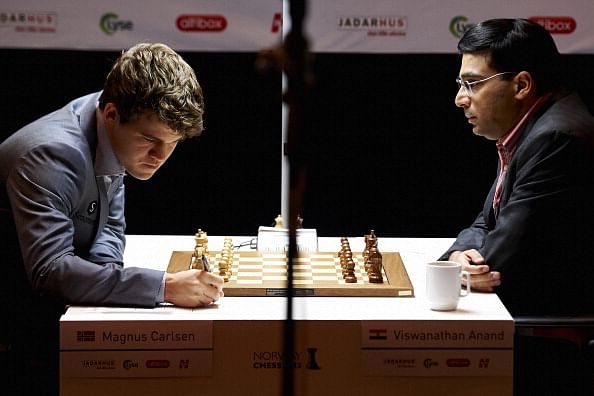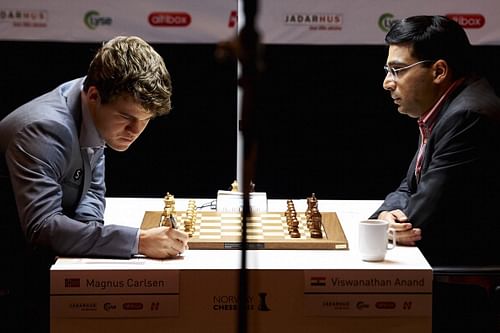
World Chess Championship 2013: Carlsen's 'endgames' spells doom for Anand

At the end of first-half of the World Chess Championship being held in Chennai, Magnus Carlsen of Norway leads by two points and is on his way to World Championship glory. His wins in game 5 and 6 were typical grinds in the endgame, inducing errors by mounting immense pressure on his aging adversary. Anand has been clearly outsmarted since he hasn’t been able to come-up with any ground breaking novelties in the opening, unable to complicate the middle-game and ending up in Magnus’ territory of torture.
The hallmark of a great champion is adaptability and Anand has shown his ability to adapt to different styles in the past. He was at his tactical best against a risk-averse Vladimir Kramnik, frustrated Veselin Topalov with a positional approach and played the waiting game against a well-prepared Gelfand. But now is facing a monster of a player in Magnus Carlsen who doesn’t seem to have any weakness whatsoever.
Magnus Carlsen started as the favorite to win this World Championship: He was in supreme form compared to Anand’s flagging spirit in the past couple of years, Anand’s two best seconds backed-off making his team weaker, Anand lacked the fire to prove superiority – admitting that he was no longer the favorite. The only thing in favor of Anand was his match experience and Magnus’ lack of exposure on the big stage. However the only moment during the world championship where Magnus looked jittery was in the first game after which he got into his groove rather quickly. Maybe his modelling stints have helped him cope-up with media pressure and he knows how to calm down his nerves.
Anand was strangled in the maze of Magnus in game 5 and 6. The rook endings that ensued in both the games looked equal, but were never trivial since the positions were dynamic with lots of possibilities which is a Magnus specialty – accumulating static advantages and transposing into a dynamic endgame. Magnus with his style has challenged the traditional thought that endgames with equal evaluation always ends in a draw at the elite level. His style has all of a sudden opened the hidden secret doors in endings bewildering his opponents and forcing them to make the right choice on every move. His style has exposed the complexity of the game and soon chess experts may have to use the words “initiative” and “endgame” in the same sentence.
We live in the age of computers where no human can even come close to beating a strong chess engine in a match. World Champion Anand has given an interesting perspective on how computers have revolutionized the chess world, in a must read article which can be found here. I found the below quote by Anand very interesting:
“Top competitors who once relied on particular styles of play are now forced to mix up their strategies, for fear that powerful analysis engines will be used to reveal fatal weaknesses in favoured openings.”
It is obvious that computers have made the game of chess more complex with top players struggling to remember their preparation in openings and middle-game which are the most complex phases of the game. Note that the emphasis is on “Opening” and the ensuing “Middlegame”, which suits a certain style of play.
The big question here is: What is Magnus’ secret? Does his astronomical rating suggest that he is better than the other top grand masters in remembering his preparation? The simple answer is “NO”.
It seems that Magnus concentrates more on “endgames” compared to his contemporaries. When you learn the game of chess you often start by learning elementary endings since they are simple positions with fewer pieces on the board. Given the fact that computers have made the game more complex, the ideal way to start your exploration is by revisiting the endgames, which is what the smart Magnus Carlsen has done! This is the exact reason why he chooses sidelines in openings to evade his opponents’ opening landmines and then equalizes in the middle-game to enter a dynamic endgame which looks equal.
Magnus has obviously put in a lot of effort preparing endgames with computers to find hidden complex ideas. He conserves his energy for the endgame and once reached, he would have an opponent who has used up his energy and time trying to re-collect his preparation and he starts mounting pressure until his opponent cracks. I call it “The Magnus Method”.
World Champion, Anand doesn’t have the time to crack “The Magnus Method” so I guess the only way he can fight to survive is by avoiding the endgame at all costs! He somehow needs to find a way to complicate the position in the middle-game. He needs to awaken the tactical monster in him before its too late!